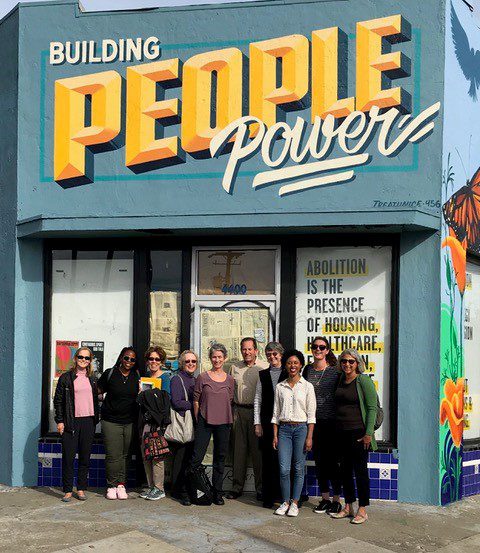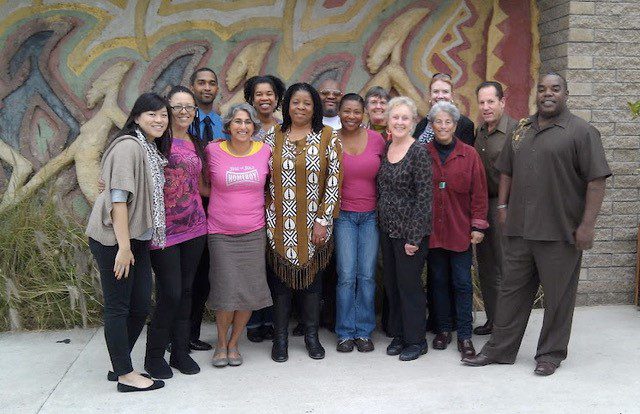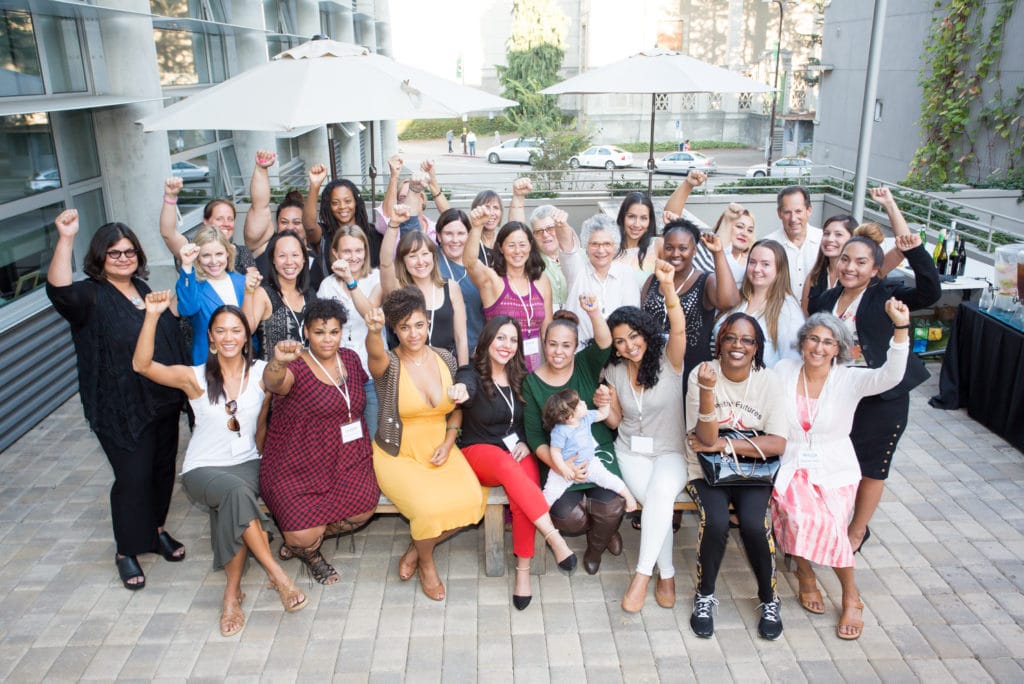
“The mass incarceration of people of color is a modern day extension of slavery and the Jim Crow era. Just like we needed the abolition and the civil rights movements to combat slavery and Jim Crow, we now need a movement to combat the mass incarceration of people of color.”
~ RGHR Member, Deborah Drysdale quoting author Michelle Alexander’s book The New Jim Crow: Mass Incarceration in the Age of Colorblindness

Who We Are
“The RGHR Fund is hands-on and thoughtful. They regularly visit the organizations they support and women’s prisons. They helped us to create strategies and communications campaigns. They are very engaged and work to make change happen. They get it.”
~ Susan Burton, Executive DirectorA New Way of Life Reentry Project
Founded in 2002 by a group of committed donors, the Race, Gender and Human Rights (RGHR) Fund promotes racial and gender justice by challenging the criminal legal system and mass incarceration in California. The Fund focuses on the system’s impact on women and girls (inclusive of cisgender, transgender and gender non-conforming individuals), prioritizes the leadership of formerly incarcerated women, and invests in efforts that build the justice movement and advance systemic change.

What We Do
The RGHR Fund is deeply committed to working strategically with our grantees and partners, and has invested more than $6 million to foster justice in California. We support the field through strategic grantmaking, convenings, rapid response funding, donor engagement and partnerships. RGHR prioritizes underfunded communities and underserved regions, centers those most impacted by the criminal legal system, and supports policy change in our state. The Fund is housed at the East Bay Community Foundation.
The RGHR Fund works to grow justice-focused philanthropy and to increase funding of criminal justice issues. RGHR co-founded the California Criminal Justice Funders Group, a network of funders and donors aligned with the movements to advance abolition and end the policing, criminalization, imprisonment and the disinvestment of communities in California.
Why We Do It
“Mental health services and drug treatment will say no to our communities. Education will say no. Affordable housing and safe neighborhoods will say no. Health care will say no. Jobs will also say no. But prisons, prisons will always say yes.”
~ Tanya, a formerly incarcerated woman in California
The United States is home to 4% of the world’s female population, and yet incarcerates 30% of women worldwide. In 2019, there were more than 231,000 women and girls held in prisons, jails and youth facilities across the country. Since the 1980s, the rate of cis and trans female incarceration has exploded by 700%. This is a result of more expansive law enforcement efforts, stiffer drug sentencing laws, and post-conviction barriers to reentry that uniquely affect women.
Women caught up in the US criminal legal system experience high rates of poverty, community violence, sexual and/or physical abuse, mental health and addiction issues, and trauma. Instead of addressing women’s fundamental safety, healing and economic needs, the system perpetuates further trauma. California spends billions on incarceration rather than on what women and families actually need to heal and thrive: social services, treatment, health care, jobs, living wages, housing and family support.
Of the thousands of women incarcerated in our state, two-thirds are imprisoned for nonviolent, non-serious offenses that are poverty, property-theft, or drug-related. Incarceration disproportionately impacts cis and trans black and Indigenous women and women of color. Black women and girls are incarcerated at twice the rate of white women and girls. One of every two Black transgender women have been incarcerated or system involved. Latinx and Native women are also heavily impacted.
More than 80% of incarcerated women are the primary caretakers of their children, causing significant familial distribution. The incarceration of women correlates directly with children being cared for by relatives or placed in the foster care system. Incarcerated women risk losing their parental rights.
As members of communities that face poverty, violence, criminalization and incarceration, women of color are disproportionately impacted when family members are incarcerated. One in four women in the US have an incarcerated loved one, causing psychological distress, trauma and financial and social hardships.
Despite mass incarceration’s devastating impact on cis and trans women and families, many organizations and communities working to advance systemic change and to bring dignity to system involved people remain significantly under-funded by philanthropy. The Race, Gender, and Human Rights Fund is seeking to change that. We invite you to join us.
Current Grant Partners
All of Us or None, Bakersfield
Because Black is Still Beautiful
California Coalition for Women Prisoners
California Criminal Justice Funders Group
Californians United for A Responsible Budget

Join Us + Make an Impact
Member
RGHR members meet regularly to strategize, engage in collective learning and make funding decisions. Meetings feature field leaders, experts and engaging discussions focused on some of the most challenging issues of our time. Members participate in onsite and virtual meetings with grant partners, visit prisons and detention facilities, and attend RGHR events.
Investor
Excited to learn more and contribute to this movement for change? Another way to support this strategic work is to partner with RGHR by investing in the fund. Become a donor of the RGHR Fund, attend our events and receive annual updates.
Contact Us
To learn more about the RGHR Fund or to explore membership and investment opportunities, please contact RGHR’s Senior Philanthropic Advisor, Anuja Mendiratta, at amendiratta@eastbaycf.org.
Learn More
Explore these resources to learn more about the criminal legal system and mass incarceration’s impact on cis and trans women and their communities:
A Radical Model for Decriminalization – Young Women’s Freedom Center
Criminalizing Survival – Survived & Punished
Testif-i | Storytelling for Change by Formerly Incarcerated Women – A New Way of Life ReEntry Project
The Fire Inside Newsletter – California Coalition for Women Prisoners
Who Pays?: The True Cost of Incarceration on Families – Ella Baker Center, et al.
Invisible Bars: Barriers to Women’s Health & Well-Being During and After Incarceration – Kim Carter, Disep Ojukwu, MPH & Lance Miller, MA
Why Black Girls are Targeted for Punishment at School — and How to Change That – TEDWomen Talk by Monique Morris
A New Way of Life Re-entry Project: Case Study – Jorja Leap & Associates
Because She’s Powerful: The Political Isolation and Resistance of Women with Incarcerated Loved Ones – Essie Justice Group
Breaking the Silence: Civil and Human Rights Violations Resulting from Medical Neglect and Abuse of Women of Color in Los Angeles County Jails – Dignity and Power Now
Overlooked: Women and Jails in the Era of Reform – The Vera Institute for Justice
Women’s Incarceration Rates Are Skyrocketing. These Advocates Are Trying to Change That. – The Vera Institute for Justice
Women’s Voices: Stories from women changing the criminal legal system. – The Vera Institute for Justice
Bias Behind Bars: Decreasing Disproportionate Rates of Incarcerated Women in California and Nationwide for Low-Level Offenses – The Women’s Foundation of California
Women and Injustice: Gender and the Pathways to Jail in NYC – The New York Women’s Foundation
The Crisis of Criminalization: A Call for a Comprehensive Philanthropic Response – Andrea Ritchie
Invisible No More: Police Violence Against Black Women and Women of Color – Andrea Ritchie
Expanding Our Frame: Deepening our Demands for Safety and Healing for Black Survivors of Sexual Violence – Andrea Ritchie
Women’s Mass Incarceration: The Whole Pie 2018 – Prison Policy Initiative
Through their Eyes: Stories of Reflection, Resistance, and Resilience on Juvenile Incarceration from San Francisco cis and trans young women, trans young men, and gender-expansive youth – Young Women’s Freedom Center
Reformist reforms vs.abolitionist steps to end IMPRISONMENT – Critical Resistance
Incarcerated Women and Girls – The Sentencing Project
Relevant Reports + Articles on Women and the Criminal Justice System – compiled by the Prison Policy Initiative